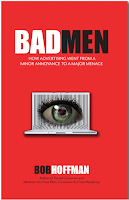"Thanks to YouTube -- and blogging and instant fact-checking and viral emails -- it is getting harder and harder to get away with repeating brazen lies without paying a price..."If you need evidence of the astounding naivete of the above sentence, I suggest you Google "9/11 plot" or "holocaust denial." While the web has certainly opened up some powerful new avenues for free speech and news, it has also become an incubator for nut jobs, terrorists, pedophiles and all manner of unpleasant human life. More a mixed blessing than a utopian dreamworld.
Another of the questionable claims made about the web is that it will make advertising less effective by diminishing the influence of media-driven images in favor of person-to-person experience. In other words, consumers will consult the web for the true experiences of people like them instead of relying on the vague assurances that advertising provides. Once again, while it is certainly true that many people use the web to check peer recommendations, the idea that this will replace advertising is highly questionable.
Whether the web will make advertising less effective is an interesting proposition as it goes to the very essence of how advertising works, how ideas are distributed, and how our behaviors are shaped.
It is pretty clear that people substantially rely on others for their opinions. We believe all manner of nonsense we would never accept without the assurances of "experts," "spiritual leaders," and "political leaders." In the electronic age there also arrived a new and very powerful formulator of beliefs, called "the media."
"The media" is ostensibly just a vehicle by which ideas are distributed, but you would have to be a fool not to believe that media companies have gotten deeply into the business of formulating and spinning many of the ideas they trade in.
One of the huge advantages that large enterprises have over small ones is the money they have to influence us through the use and manipulation of media. It is hard to exaggerate the power that media distributed ideas have on our opinions, and even more importantly, on our behavior. It is also hard to exaggerate the lengths to which advertisers have been going, and will continue to go, to blur the line between media-delivered information and advertising.
Consequently, if the predictions that advertising will become a less pervasive force in our lives is true, then it must also be true that media-driven ideas will become less pervasive. This seems highly unlikely.
In fact, the amount of time people spend with media, particularly TV and the web, is nothing short of alarming. And as mobile devices become more prevalent the number of hours spent with media may actually surpass the number of waking hours (because of the ability to use more than one device at a time.)
And media is supposed to become less influential? I don't buy it.
The web notwithstanding, experts, spiritual leaders, politicians, and media will continue to fill us full of nonsense and we will continue to accept it.
Yes, there is a future for advertising.





No comments:
Post a Comment